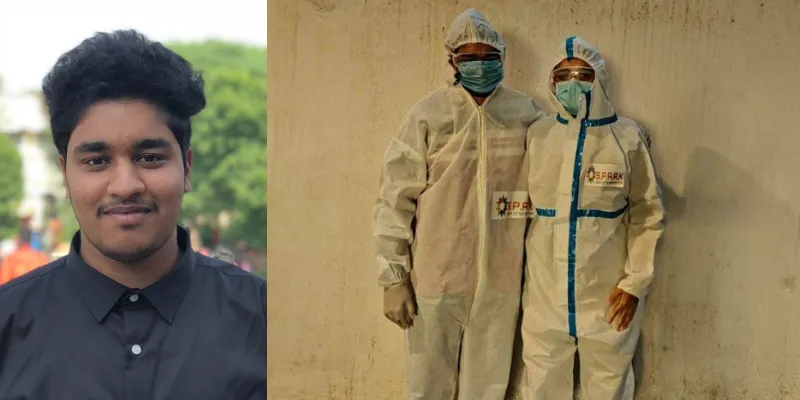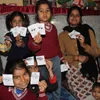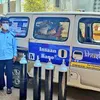[COVID Warrior] How this student-run NGO raised over Rs 40 lakh to help children, underprivileged during the pandemic
Bengaluru-based SPARK is a social welfare platform that helps underserved communities and children access better education and healthcare facilities.
Seeing his parents run a non-profit in the healthcare sector, BITS Pilani student Akarsh Shroff understood the value a volunteer can provide to a less privileged community and wanted to share the same with his classmates.
In 2018, he founded SPARK — a social welfare platform — that aims to bring youngsters together to create a brighter future for the underprivileged.
At present, the NGO operates in 11 locations in Karnataka and works with orphans and the underprivileged.
Initially, SPARK stood for “Socially Productive And Responsible Karnatakans”, but the NGO does not use the full form anymore since it started expanding beyond the southern state.

(Left) Akarsh Shroff; (Right) Akarsh Shroff and Akarshan Majumdar on-ground
Before COVID-19, SPARK carried out four projects. Each of these initiatives was designed to academically mentor children in orphanages (Project Vineeta), creating libraries and inculcating reading habits (Library Enrichment And Development or LEAD), developing linguistic skills (Project Utsaaha), and conducting workshops for public speaking, debating, and articulation (Project Ullaasa).
Akarsh, who is also the President of SPARK, says these initiatives have impacted over 500 children.
Amidst the COVID-19 pandemic, the NGO managed to carry out one of its biggest projects — Project Q. This initiative raised a total of Rs 40 lakh during the first and second COVID-19 waves, impacting over 11,000 beneficiaries to date.
Project Q
During the first COVID-19 wave, Akarsh and the NGO started Project Q to provide meals and ration kits to migrant workers and their children, who decided to walk back home amidst a nationwide lockdown.
The NGO focused on children who had no access to proper healthcare or learning facilities at the time. To further ramp up its efficiency and reach, SPARK partnered with like-minded NGOs.
SPARK collaborated with NGO Uthishta and distributed 575 ration kits and 2,000 kg of rice in Rajajinagar, Indiranagar, and Domlur regions.
It also distributed over 5,600 meals in VV Puram through a collaboration with BSHIP, about 1,800 meals in collaboration with VSK in RR Nagar, Vijayanagar, and Chamrajpet, and also distributed over 2,000 kgs of rice with the help of the Robin Hood Army.
“We provided a total of 6,000 masks during our COVID-19 relief programmes to children at orphanages,” says Akarsh.

At one of the food distribution drives
In fact, once schools reopened, SPARK also offered a total scholarship of Rs 1.8 lakh to children whose parents were out of a livelihood and were unable to pay their school tuition fees.
Amidst the first wave, SPARK raised about Rs 20 lakh, impacting over 11,000 beneficiaries.
A year later, it started Project Q 2.0 during the second wave, which focused majorly on providing essential support to relieve the pressure on existing healthcare infrastructure.
SPARK procured and distributed essential equipment, including oxygen concentrators, oxygen masks, pulse oximeters, PPE kits, sanitisers, and surgical gloves, among others, to various PHCs, hospitals, and isolation centres in six districts (Urban Bengaluru, Rural Bengaluru, Hassan, Hubli, Mysore, and Ballari districts) of Karnataka.
The NGO’s volunteers also continued with their existing activities, which included providing over 300 ration kits, 18 oxygen concentrators, more than 155 oximeters, more than 1250 PPE kits, and other essentials
For the students, by the students
Vice President Akarshan Majumdar, a student of Jindal Global Law School says SPARK — the student-led organisation — was started with 20 individuals and has now grown to over 600 student volunteers.
The volunteers have been working towards building credibility, which is one of the main reasons that helped the NGO raise funds. This was not an easy feat when they first started, Akarshan adds.
“In January 2020, we started a fundraiser and were able to raise only Rs 15,000 despite our different outreach programmes. That is when we realised we needed to build credibility. So through this, we studied other NGOs and understood how to build credibility and create annual reports, impact assessment frameworks, and project reports, which was difficult for us as students,” he further shares.

Oxygen concentrators provided by SPARK
This learning helped them improve and raise more funds during the pandemic. SPARK raised funds through several sources. They also partnered with local businesses that promoted SPARK’s cause through their websites.
In fact, they reached out to the alumni networks of volunteers who donated to the cause.
“We also leveraged personal contacts for the fundraisers. In the last phase, we received corporate support of Rs 5 lakh. Other organisations like Manipal Hospital made in-kind donations besides the Rs 40 lakh that we were able to raise,” says Akarshan.
Due to these efforts, Akarsh Shroff also received the Diana Award 2021, which also recognised the impact of the NGO.
Established in the memory of Diana Spencer, Princess of Wales, the Diana Award is given to young humanitarians across the world who “inspire positive change in the future of young people.”
Challenges and the road ahead
For SPARK, one of the biggest challenges was raising funds. But as the organisation grew, while learning from other NGOs and rectifying its mistakes, it was able to raise more funds during the pandemic.
In fact, Akarshan says, “We raised about Rs 40 lakh within two weeks of starting the fundraiser for the second wave.”
Another challenge was accommodating every student volunteer, which was a task since they were enrolled on different universities and had different class and exam schedules.
Despite the hurdles, the 600+ volunteers still try to come together for the cause aligned with the NGO’s vision.

A 12-bed facility opened by SPARK at CVR Nagar
Moving forward, SPARK is looking to expand its reach and operations. “We are working in more remote and rural areas in Karnataka and expanding to other states,” Akarshan says.
SPARK is also trying to reach out to smaller orphanages and help improve their infrastructural difficulties. It also wants to build more ICU facilities with partner organisations within Karnataka.
Besides, “We are also working with the local panchayats to ensure that children get access to unhindered health and educational facilities in the long run, and we want to reach at least 10 villages in Karnataka,” says Akarsh.
Edited by Suman Singh

![[COVID Warrior] How this student-run NGO raised over Rs 40 lakh to help children, underprivileged during the pandemic](https://images.yourstory.com/cs/5/98c65090592f11ea9f62339ce853ca75/Image3d5k-1626751902929.jpg?mode=crop&crop=faces&ar=2%3A1&format=auto&w=1920&q=75)






